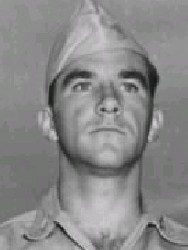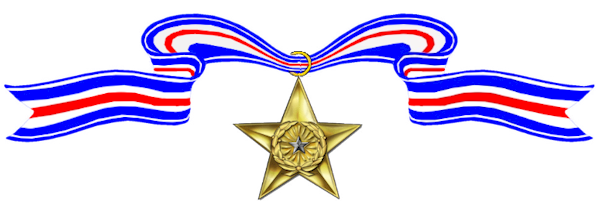During World War II, Donald McGee became a U.S. Army Air Forces ACE, credited with shooting down 6 enemy aircraft in aerial combat. After the war he transferred to the new U.S. Air Force, and retired in 1967 as a Lieutenant Colonel.

–
Born:
,
Home:
,
Buried:
,
Cemetery:
Awards Received
-

Silver Star
-

Silver Star
-
Silver Star
Service:
United States Army Air ForcesRank:
Major (Air Corps), [then First Lieutenant]Batallion:
80th Pursuit SquadronRegiment:
8th Pursuit GroupDivision:
Far East Air ForceAction Date:
May 29, 1942
Headquarters, V Fighter Command, General Orders No. 5 (February 6, 1943)The President of the United States of America, authorized by Act of Congress July 9, 1918, takes pleasure in presenting a Bronze Oak Leaf Cluster in lieu of a Second Award of the Silver Star to Major (Air Corps), [then First Lieutenant] Donald Charles McGee (ASN: 0-430836), United States Army Air Forces, for gallantry in action against the enemy while serving as Pilot of a P-39 Fighter Airplane of the 80th Pursuit Squadron, 8th Pursuit Group, Far East Air Force, in action over Hood Bay, New Guinea, on 29 May 1942. The gallant actions and dedicated devotion to duty demonstrated by Major McGee, without regard for his own life, were in keeping with the highest traditions of military service and reflect great credit upon himself and the United States Army Air Forces.
-
Silver Star
Service:
United States Army Air ForcesRank:
Major (Air Corps), [then First Lieutenant]Batallion:
80th Pursuit SquadronRegiment:
8th Pursuit GroupDivision:
Far East Air ForceAction Date:
May 28, 1942
Headquarters, 5th Air Force, General Orders No. 11 (September 30, 1942)The President of the United States of America, authorized by Act of Congress July 9, 1918, takes pleasure in presenting the Silver Star to Major (Air Corps), [then First Lieutenant] Donald Charles McGee (ASN: 0-430836), United States Army Air Forces, for gallantry in action against the enemy while serving as Pilot of a P-39 Fighter Airplane of the 80th Pursuit Squadron, 8th Pursuit Group, FAR EAST Air Force, in action over Port Moresby, New Guinea, on 28 May 1942. Major McGee was pilot of a pursuit plane which participated in an attempt to intercept the enemy. Twenty-Five Zeros attacked, sending elements to the front and rear of our formation. In spite of their numerical superiority, and heavy cannon and machine gun fire which came from all directions, Major McGee turned and made a head-on attack on the main flight and succeeded in damaging at least one Zero. Instead of diving and attempting to escape, Major McGee, noticing an enemy fighter attacking a P-39 from the rear, quickly went to the attack and succeeded in causing the Zero to withdraw. He then noticed another of our planes smoking badly with Zeros still attacking. Again he went to the aid of the pilot and saw tracers entering one of the Japanese fighters. The pilot of the P-39 was forced to parachute and Major McGee attacked the remaining Zeros and forced them to withdraw. This gallant action enabled his fellow officer to land safely. The gallant actions and dedicated devotion to duty demonstrated by Major McGee, without regard for his own life, were in keeping with the highest traditions of military service and reflect great credit upon himself and the United States Army Air Forces.


